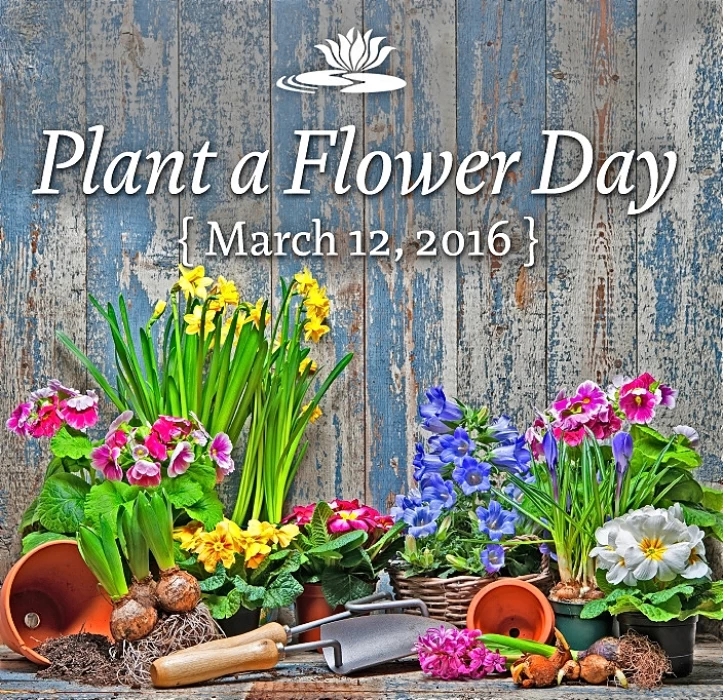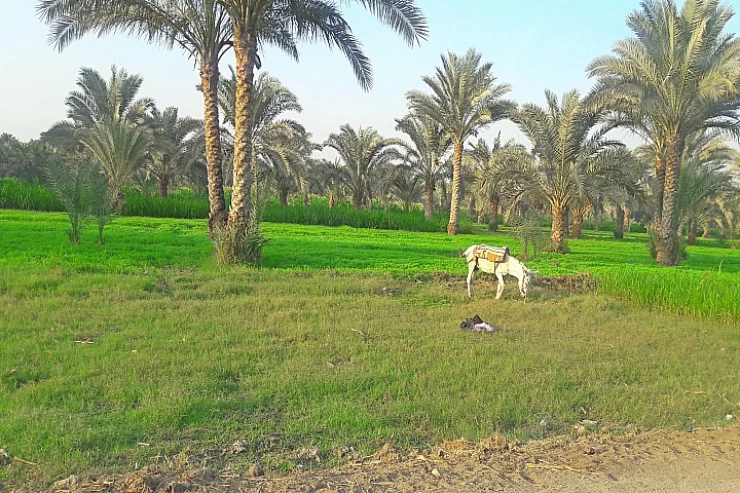
March National Flower Day & Plant-a-Flower Day
National Plant a Flower Day
Spring is just around the corner, and the 12th of March is the day to participate in National Plants and Flower Day. Every year, this day is dedicated to planting flowers and looking forward to spring.
Flower gardening has become a passion for many, young and old, and the National Plant a Flower Day is a start of a new season every year. It's useful to know the region in which you live to decide the flowers grow as perennials (those that grow back every year) in your area and which are called annuals (those that require planting every year).
Seeds can be started inside and placed in a sunny window. Move the plants outside when the weather is nicer. Keep the soil moist but not wet, and follow the directions of the seed packet for proper germination of the seedlings. Those that can't wait, get the seed catalogs out and start preparing your next flower garden. Flowers always make people better, happier, and more helpful; they are sunshine, food, and medicine to the soul. Luther Burbank, botanist (1849-1926)
History of The National Plant a Flower Day
Back in 2500 BC, the Egyptians put flowers in vases to make floral arrangements and express their love for both the living and the deceased. As years have gone by, many of the practices maintained by our ancestors are still commonly followed and remembered. For example, the meanings of certain flowers remain valid.
National Flower Day
The Egyptians arranged lotus flowers, known to represent rebirth and enlightenment, within burial tombs. But the importance of flowers doesn't just end at their meaning or beauty. Like houseplants, flowers provide a number of benefits. Insects, birds, and even bees feed on the nectar that flowers produce, unwittingly pollinating other plants and helping them to reproduce. In addition, flowers can also help us strengthen our immune system, improve our mood and increase our energy levels.
After all this, it's no wonder that we welcome spring with National Flower Day or Plant a Flower Day.
How to Celebrate the Day
On the Day of Flowers, people are encouraged to plant all sorts of flowers. You could plant flowers in your backyard and enjoy the flowering plants as the weeks go by. If you don't have a yard or if you just have too many flowers already planted, visiting the gardens is a wonderful idea. You're not only going to have the ability to plant flowers, but you're also going to be able to connect with professional gardeners and learn some gardening tips along the way.
Experience the Best Gardens of Egypt
Or man botanical garden
Orman Garden, one of Egypt's most prominent botanical gardens, was established during the reign of Khedive Ismail in 1875. He ordered the French architects to construct it, as he wanted to supply the royal palace with various kinds of fruit and vegetables. Brought from various parts of the world, including Europe and China, this garden used to host more than 150 species of flowers and more than 500 species of rare plants.
World Flower Day
This makes the garden the ideal host for its popular annual spring festival, which attracts tourists during March and April. Covering about 28 acres, the garden also has a pond with a wooden bridge over it. Is situated west of the Nile River, next to the Giza Zoo, and east of the Cairo University
The Aswan Botanical Island (Kitchener's Island)
Aswan Botanical Garden is actually the whole island known as Kitchener Island. Slowly but surely, the island was transformed into a world-class botanical garden when it was given to Lord Kitchener in 1898.
It's a great place to go and relax if you need to escape from the crowd in Aswan. While most of our Egypt tour packages do not include a visit to the gardens, we can include them if required. Some of our Nile River cruises also involve a short trip on traditional felucca boats around the island. It is, without doubt, one of the most beautiful and calming attractions in Aswan.
Nowadays, the Aswan Botanical Garden is very popular with locals, but it's so much more than just a lovely place to enjoy a weekend picnic or a leisurely walk. Instead, the Aswan Botanical Garden also serves as a significant center of botanical research to test the viability of certain plant species in the Egyptian climate.
There is a wide range of plantations and trees on the island. Some of them had naturally been discovered on the island until it had been turned into a botanical island, and others had been brought in. There are a variety of unusual palm trees such as the Royal Palm Tree, the Cabal Palm Tree, and the Phonic Pam Tree.
Aswan Botanical Gardens can be visited in a variety of ways. For example, as part of a "felucca" tour of the river and the islands of Aswan. Many tourists like to visit the gardens. Most of these tours will stop at Kitchener Island, but not all of them, so it's best to make it clear when you book your tour. Another choice will be to use one of the nearby river ferries.
All things considered, the park is certainly worth exploring, particularly if you want to see hundreds of tropical and native plants, while at the same time enjoying some clean fresh air and tranquility! Do you want your Egyptian holiday break to include a trip to the Botanical Gardens? We have been designing and selling custom Egypt tours and Egyptian travel packages, and such a huge amount of experience will soon become evident when you book a tour with us.
Latest Articles
Admin
Seabourn Sojourn Cruise Stops in Safaga Port
The Seabourn Sojourn, the flagship vessel of Seabourn Cruise Line's ultra-luxury fleet, was built in 2008 at the T. Mariotti shipyard in Genoa, Italy. Measuring 198 metres, it can accommodate up to 450 guests in its 225 spacious all-suite staterooms.
Admin
Norwegian Sky Cruise Stops in Safaga Port
Norwegian Cruise Line operates a cruise ship called the Norwegian Sky. It was constructed in 1999 and can accommodate 2,004 passengers in addition to 878 crew members. The ship has several dining establishments, lounges and bars, a spa and fitness center, swimming pools, and a number of entertainment areas.
Admin
Explora II Cruise Stops in Safaga Port
Explora II, the second vessel in the Explora Journeys fleet, sets sail in 2024 to redefine luxury cruising. With 461 ocean-front suites, 9 culinary experiences, and 4 pools, this haven of sophistication and sustainability promises an unforgettable "Ocean State of Mind" journey to inspiring destinations.
Admin
Mein Schiff 6 Cruise Stops in Safaga Port
The Mein Schiff 6 is the latest cruise ship in the renowned TUI Cruises fleet, offering passengers a luxurious and sophisticated cruise experience. At 315 metres long, this floating resort features a range of dining options, entertainment, and recreational facilities, including a spa, fitness centre, and sports amenities.
Admin
Mein Schiff 4 Cruise Stops in Safaga Port
When the Mein Schiff 4 cruise ship docks in Safaga, Egypt, passengers are granted access to a realm of ancient wonders. Aboard this state-of-the-art vessel, guests can embark on meticulously curated shore excursions that showcase the region's most iconic landmarks, including the Giza Pyramids, the enigmatic Sphinx, and the remarkable tombs and temples of the Valley of the Kings in Luxor.
Admin
MS Europa Cruise Stops in Safaga Port
The Silver Moon, Silversea's latest flagship, is a luxury cruise ship that offers an exceptional travel experience for Venezuelans exploring Egypt. With a capacity of 596 guests and an impressive 40,700 gross tonnes, the Silver Moon maintains the small-ship intimacy and spacious all-suite accommodations that are the hallmarks of the Silversea brand.














